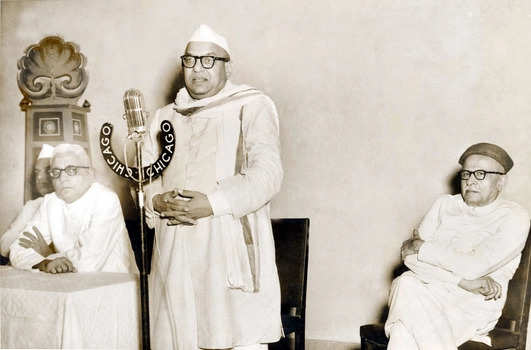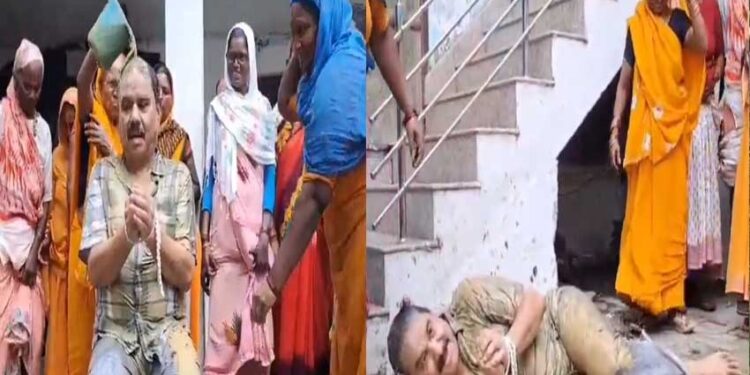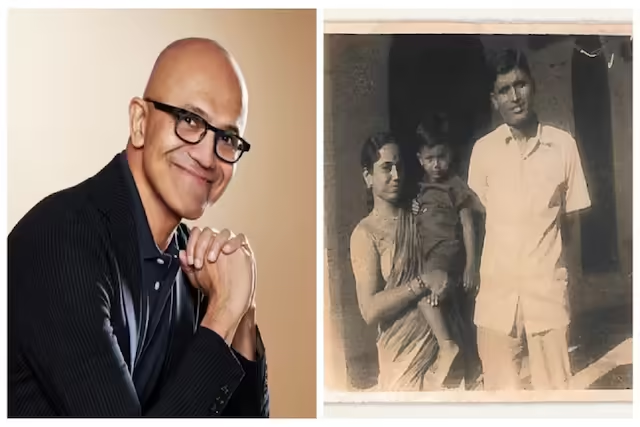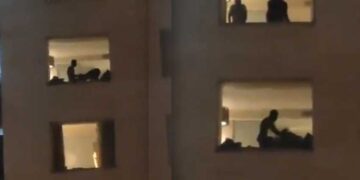History News Desk !!! Bhushbhushi Anantashyanam Iyangar (English: Madabhushi Ananthasayanam Ayyangar, born: 4 February, 1891, death: March 19, 1978) was the second Lok Sabha Speaker of India. First Speaker of Lok Sabha G.V. In order to fill the vacancy arising out of the sudden demise of Mavalankar, the lover Anantashyanam Ayyangar proved themselves sure to carry out the incomplete work of developing the achievements of freedom and the incomplete work of developing healthy parliamentary culture in the new Republic. Ayyangar left an indelible impression of his personality in his six -decade public life, a lawyer, social worker and as a freedom fighter, as an excellent MP and Speaker and a prestigious scholar, in any work area in life, an indelible impression of his personality. . He was also the Governor of Bihar.
Life introduction
Bhushbhushi Anantashyanam Ayyangar was born on 4 February 1891 in Tiruchanur near Tirupati, the spiritual city of Andhra Pradesh. After completing his early education at Devasthanam High School, Tirupati, Iyngar moved to Madras for higher education. He obtained a degree in the law from ‘Madras Law College’ in 1913 after receiving a bachelor’s degree from Pachappaj College, Madras.
Early life
Ayyangar started his life as a teacher of mathematics in 1912. In 1915, he entered the law profession. In a short time he became established as a professional advocate as he had a wonderful ability to remember judicial decisions and soon he became famous as “due to the” decision-leading curse “. Iyngar did not consider this business as a means of earning a means of earning. He was deeply interested in the judicial system of India to improve the needs of the Indian people, and it should not remain as a branch of the English judicial system. Therefore, he fiercely advocated the independence of the judiciary and demanded the Government of India to increase the level of Federal Court to Supreme Court status. The final appeal in the Indian judicial system was very concerned about the difficulties that Indians used to present in the Privy Council of England and were very concerned about the manner in which he had to bear the disdain. Iyngar was an active lawyer and was also the president of his hometown Chittoor’s ‘Bar Association’.
Freedom movement
Ayngar jumped into the freedom movement at a very young age. He was one of the prominent leaders of his home state of the Indian National Congress, leading the national movement against the English rule. In response to the call made by Gandhiji for “non-cooperation” towards English, Iyngar also stopped its legal practice for one year during 1921-22.
In 1934, when the Congress withdrew its policy of boycott of councils and decided to contest the election of ‘Central Legislative Assembly’, Ayyangar was elected members of the Assembly with an overwhelming majority. The aim of the Congress behind contesting elections was to fight the government by staying in the government. Ayyangar soon created his image as a strong debate in the Central Legislative Assembly due to the complete knowledgeable knowledge of the facts and data and naturally in the debate. He came to the next line from the previous queue and then there was a time that there was no day when he did not say anything tremendous in the interest of Congress and national movement against the government in the meeting. Impressed by this remarkable working style of Iyangar in the meeting, an European writer mentioned him as “Amden of the House”.
Quit India Movement
Between 1940 and 1944, Ayyagar first had to be sentenced to imprisonment for nearly three years in the first “individual Satyagraha movement” and later to participate in the “Quit India Movement” of 1942. Apart from active participation in the political freedom movement of the country, Iyngar contributed to many other activities done for the social freedom of the Dalit classes of the society. Inspired by Gandhiji’s creative programs to fight social evils like untouchability, he was at the forefront of such movements to ensure entry of Harijans to the Iyangar temple and to ensure untouchability in his home state. Ayyangar later launched several programs for the economic and social upliftment of Harijans as the president of ‘Harijan Sevak Sangh’.
Political introduction
Iyengar was one of the leading leaders of the Congress party in Andhra Pradesh and before independence he beautified many important positions. He was the President of the District Congress Committee, Chittoor. Later, he was elected to the Andhra Provincial Congress Committee and the All India Congress Committee. During 1946–47, he was also the Secretary of the Congress Party in Parliament.
Member of the Constituent Assembly
Iyngar also served as a member of the Constituent Assembly. As a result of the decision to separate the Constitution of Constitution Assembly from its legislative act and later G. When V. Mavalankar was elected as the chairman of the Constituent Assembly (Legislative), Ayyangar was elected to its post of vice -president, he was also a member of the Steering Committee of the Constituent Assembly. The Iyngar remained the Deputy Speaker of the Interim Parliament during 1950–52. When the ‘Estimates Committee’ was formed for the first time by the Interim Parliament in 1950, the Ayyangar was elected its Chairman. He conducted its meetings efficiently and earned a name for this committee.
First Lok Sabha Deputy Speaker
When the first Lok Sabha was formed in 1952, the Ayyangar was unanimously elected to its post of vice -president. While discharging his duties as the vice -president, Ayyangar also assumed the additional responsibility of the Chairman of the Estimates Committee of the Lok Sabha for two years and the Chairman of the Railway Conference Committee for the next two years.
Lok Sabha Speaker
He took over the responsibility of the Lok Sabha Deputy Speaker until he was unanimously elected the Speaker of the Lok Sabha on March 8, 1956 after the sudden demise of Chairman Mavalankar. Holding the highest position of the Speaker of the Lok Sabha was the climax of his legislative life that started in 1934 from the Central Legislative Assembly. By that time, Iyngar had already proved himself a vocal and influential MP from the knowledge of long experience and work and functioning of parliamentary institutions and their process and operation. He was committed to maintaining parliamentary values. He was of a very humorous nature and by humorous, he not only made parliamentary action alive, but his nature sometimes helped him to keep his point in Parliament in a more effective and interesting manner. When the second Lok Sabha was formed in 1957, once again Iyngar became the unanimous choice of the meeting for the post of president for the next five years. The innumerable specifications and comments that Iyangar gave as the Speaker clearly gave their political philosophy, legal-concentration, their mastery in parliamentary processes and the feeling of respect for him, understanding of the dynamic powers of administration and great problems of the country And reflects the identity of interests. He gave brief and clear control over the questions raised before him. He is credited with many such speculations and directors, by which many complex parliamentary issues were resolved in the essence of the Indian Republic.
On leaving the post of president in 1962, Iyangar was praised in the same way as Shri Dadasaheb Mavalankar was done in 1956. Due to these two prestigious presidents, the foundation of a strong and healthy parliamentary culture could be laid in India. The democratic institutions of India, their complete commitment to parliamentary institutions, their vigilance in maintaining the dignity of the assembly, the prestige of the members and the values of parliamentary democracy and their tireless efforts in developing health and healthy parliamentary procedures and contingent are indebted to them.
As MP
Ayyangar was an active MP and he was associated with many socio-cultural and educational organizations even after taking an active political life in later years. These organizations include Harijan Sevak Sangh, Ram Vilas Sabha, Dramatic Association of Chittoor, The Constitution Club and the Idion Association of World Federal Government. In the 1962 general elections, Iyngar was elected to the Lok Sabha for the third time. However, he resigned from his membership immediately after being elected as the Governor of Bihar. In this way, his nearly three decades long excellent parliamentary term came to an end. U
Governor of Bihar
As the Governor of Bihar, after serving for a full tenure, Ayyangar took an active political life and went to his hometown Tirupati to spend the final year of his life. Even in this state, Iyngar was very active.
An invaluable contribution in the field of education
After parliamentary life, the biggest contribution of Iyngar was in the field of education. Iyengar was a scholar Manishi who was a pundit of comparative religion, philosophy, Sanskrit, Sanskrit literature and other various subjects. In his entire life, he took great interest in the study and promotion of Sanskrit and Indian culture. He served as a member of the Central Education Advisory Board for some time and later he was the Vice Chancellor of Rishikul University, Haridwar. In view of his contribution in the field of education, Shri Vaishnav Theological University, Vrindavan honored him with an honorary title of ‘Doctorate of Literature’ (Sahitya Vachaspati) in 1954. Apart from regular editing of ‘Shri Venkatesh Patrika’, a Telugu weekly magazine, Ayyangar also wrote a book called “Under Parliament” on the Indian Parliament.
Secular personality
Iyngar believed in the basic unity of mankind and was in favor of secularism and supporters of religious unity in the country. He was very pained by spreading religious frenzy and misusing religion for political purposes. He believed that the best way to make people sensitive about the dangers of communalism is to bring public awareness about the right essence of all religions. His idea was that the development of religions has been mainly done to help in removing the differences between individual and individual and to bring a sense of fraternity in the person and uplift it by him.
Against the evils of caste-system
Ayyangar was one of the national leaders who first participated in the struggle against untouchability and caste-system evils during the freedom struggle. He believed that the caste-system was not the original part of Indian social structure, but this system was later included in it. According to Iyngar, there is no such thing as upper caste or low caste, but only the higher state of consciousness or the lowest state of consciousness. Both these situations have nothing to do with birth. He believed that depriving a person of his right to worship on the basis of birth is a crime against God. This belief inspired him to support the right to enter Dalits into Hindu temples. During the freedom struggle, he was one of the leading leaders who performed the work for the upliftment of Harijans.
Death
On March 19, 1978, Anantashyanam Ayyangar passed away at the age of 87. He was busy with the works of Sanskrit Vidyapeeth and many charitable organizations in Tirupati till the last time.






